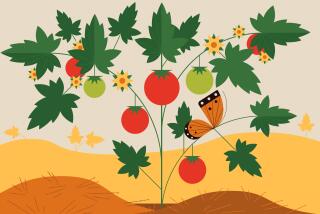Growing Into a Routine Keeps Plants Healthy
- Share via
The garden pretty much takes care of itself for the next few months. Transplants are established and seeds are sown. A periodic oiling of the garden machinery is in order to keep things chugging along. Why not set aside one day a week for attending to those repetitive garden tasks necessary for the remainder of the season? By assigning them to a specific day, you are less likely to forget to do them.
Of course, a few repetitive jobs cannot be pinned down to a weekly schedule. Lawn mowing, for instance. Depending on rainfall and how much you fertilize, your lawn might demand your attention more or less frequently than one day a week. Harvesting vegetables and fruits might require a little time every day or two. Don’t wait too long to harvest or you will miss these delicacies at the peak of flavor. Another repetitive--but not weekly--job is to keep potted plants watered.
*
Now, what can be done in and around the garden on a strict once-a-week schedule?
Those potted plants are growing luxuriantly this time of year, so they need weekly fertilization. Follow directions on the label for the particular type of fertilizer you buy. Remember that more fertilizer than is recommended will not make plants grow better. Too much fertilizer can burn a plant.
Make it a point to take a weekly stroll around the yard to deadhead (cut off) spent flowers, especially from annuals. Once flower petals start to fade, seed formation begins, which diverts plants’ energy from making more flowers.
If your strawberry bed is getting overcrowded, you’ll need to pinch off runners once a week. Each strawberry plant sends out a number of runners, each of which can produce a few daughter plants in one season. Let a daughter plant set root wherever there is a vacant spot in your strawberry bed, but then keep enough runners pinched off so that each plant is about 8 inches from its neighbors.
Newly planted trees and shrubs usually need watering during their first season. Give each plant 2 gallons of water every week, unless an inch or more of rain falls. Large plants will need more water each week, continuing on into their second, perhaps third, season.
The most important weekly job is weeding. Whether you weed with a hoe or on all fours, or smother weeds under mulch, diligently keeping weeds out of the garden now ensures an attractive and productive garden in the fall. And by not allowing weeds to set seeds or establish perennial root systems, you lessen next year’s weed problems. It is far easier to spend a few minutes each week quickly running a hoe through almost weedless soil, or pulling the few weeds that poke through mulch, than to hack away at firmly entrenched weeds.






